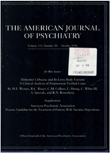Information-processing deficits and thought disorder in schizophrenia
Abstract
OBJECTIVE: The goal of this investigation was to study the relationship between information-processing deficits and thought disorder in schizophrenic patients. METHOD: Fifty-two subjects diagnosed with schizophrenia were administered tests of information processing and thought disorder. The information-processing tests included visual backward masking and prepulse inhibition of the startle reflex. Thought disorder was measured with the Magical Ideation Scale, the Scale for the Assessment of Positive Symptoms, the alogia subscale of the Scale for the Assessment of Negative Symptoms, and the Ego Impairment Index- human experience variable and its subcomponents derived from the Rorschach. RESULTS: Elevated poor responses on the Ego Impairment Index- human experience variable were significantly correlated with information-processing deficits. In a simultaneous multiple regression, the auditory prepulse inhibition measure was the best predictor of poor responses on the Ego Impairment Index-human experience variable. CONCLUSIONS: The results suggest a correlative relationship between information-processing deficits and thought disorder. The relationship is most apparent when highly sensitive measures of both information processing and thought disorder are used. Furthermore, the prediction of poor responses on the Ego Impairment Index-human experience variable by auditory prepulse inhibition is important, since the neural circuitry of prepulse inhibition is known and involves the modulatory influences of the cortical-striatal-pallidal-thalamic circuit. These findings lend support to the hypothesis that information-processing failures are associated with cognitive fragmentation and thought disorder. More speculatively, these results allow us to hypothesize that impairments in part of the cortical-striatal-pallidal-thalamic circuit may lead to thought disorder, as well as prepulse inhibition deficits.
Access content
To read the fulltext, please use one of the options below to sign in or purchase access.- Personal login
- Institutional Login
- Sign in via OpenAthens
- Register for access
-
Please login/register if you wish to pair your device and check access availability.
Not a subscriber?
PsychiatryOnline subscription options offer access to the DSM-5 library, books, journals, CME, and patient resources. This all-in-one virtual library provides psychiatrists and mental health professionals with key resources for diagnosis, treatment, research, and professional development.
Need more help? PsychiatryOnline Customer Service may be reached by emailing [email protected] or by calling 800-368-5777 (in the U.S.) or 703-907-7322 (outside the U.S.).



